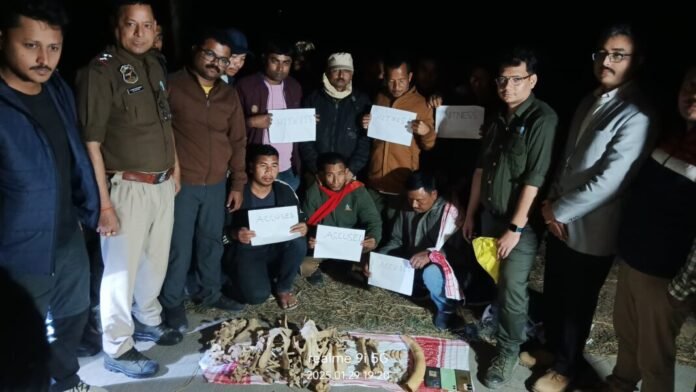In a major breakthrough against wildlife crime, Assam Police, in collaboration with the Eastern Assam Wildlife Division, arrested three individuals in Nagaon district on Wednesday for the illegal possession and trafficking of endangered animal body parts. The seized items included tiger claws, canines, bones, and an elephant tusk, highlighting the ongoing challenge of poaching and illegal wildlife trade in the region.
Authorities have confirmed that the operation was carried out based on specific intelligence inputs, reinforcing the state’s commitment to cracking down on organized poaching syndicates.
Joint Operation Leads to Key Arrests in Nagaon
The three individuals arrested in connection with the illegal wildlife trade have been identified as:
- Amar Hansey
- Mahendra Borgrang
- Probin Sangma
The joint operation, conducted by Assam Police and the Eastern Assam Wildlife Division, resulted in the seizure of multiple wildlife body parts, further exposing the presence of organized poaching networks in the state.
Taking to X (formerly Twitter), Nagaon Police issued a strong message against wildlife crime, stating, “Wildlife crime won’t go unpunished. Three accused namely Amar Hanse, Mohendra Borgrang, and Prabin Sangma were arrested in a joint operation by the Eastern Assam Wildlife Division and Nagaon Police for trafficking tiger and elephant parts. Authorities seized the recovered parts.”
The arrested individuals are believed to be part of a larger network engaged in the illegal trafficking of wildlife body parts, which are often sold in black markets for use in traditional medicine, jewelry, and luxury décor.
Separate Wildlife Crime Operation in Sivasagar
In another operation, Sivasagar Police carried out a raid in the Baasbari area of Bihubor Tea Estate, under Nazira Police Station. Acting on specific intelligence, the police apprehended an individual and recovered three pieces of elephant tusk from his possession.
This second operation further underlines the extent of wildlife crime in Assam and the increasing role of enforcement agencies in tackling the issue.
Illegal Wildlife Trade: A Growing Concern in Assam
Assam, home to diverse wildlife including the Royal Bengal Tiger, Indian Elephant, One-Horned Rhinoceros, and other endangered species, has long struggled with the menace of poaching and illegal trade. The demand for tiger claws, bones, elephant tusks, and rhino horns continues to fuel a thriving black market, despite strict conservation efforts.
The illegal wildlife trade operates through a network of local poachers, middlemen, and international buyers, with body parts often being smuggled to Southeast Asian countries, where they are used in traditional Chinese medicine, luxury artifacts, and black-market jewelry.
Despite sustained efforts by forest officials and police, traffickers continue to exploit remote forested regions and border areas to conduct illegal activities. The latest arrests serve as a warning to wildlife traffickers and a reassurance to conservationists that law enforcement remains committed to protecting Assam’s rich biodiversity.
Legal Consequences for Wildlife Crime in India
Under the Wildlife Protection Act, 1972, the illegal possession, poaching, and trafficking of endangered animal body parts carry severe penalties, including:
- Imprisonment for up to seven years
- Fines ranging from ₹10,000 to ₹50,000 or more
- Seizure of vehicles, properties, and equipment used in the crime
With the recent arrests, Assam Police have assured that strict legal action will be taken against the accused. Authorities are also investigating the possibility of a larger trafficking network connected to these individuals.
Assam’s Efforts to Curb Poaching and Wildlife Crime
The Assam government, in collaboration with national and international conservation agencies, has intensified efforts to curb poaching and wildlife trafficking. Some key initiatives include:
1. Increased Surveillance in Protected Areas
- Enhanced forest patrolling in Kaziranga National Park, Manas National Park, and other wildlife reserves.
- Deployment of special anti-poaching units and armed forest rangers.
2. Use of Technology in Wildlife Protection
- Implementation of drones and AI-based monitoring systems to track poachers.
- Real-time surveillance to prevent illegal wildlife activities.
3. Strengthening Anti-Trafficking Laws
- Stricter enforcement of the Wildlife Protection Act, 1972.
- Coordination with neighboring states and countries to dismantle cross-border trafficking networks.
4. Community Awareness and Involvement
- Conducting awareness campaigns in rural and tribal areas to educate locals on the importance of conservation.
- Encouraging community participation in wildlife protection programs.
Public Response and Need for Stronger Action
The arrest of the three accused in Nagaon has sparked a strong reaction from conservationists and environmental activists, who have long demanded stricter action against wildlife criminals. Many have called for:
- Harsher penalties for poachers and traffickers.
- Better protection for Assam’s endangered species.
- Stronger international cooperation to dismantle smuggling routes.
The general public has also been urged to report any suspicious activity related to wildlife poaching and illegal animal trade. The success of future operations depends on vigilant citizens, community cooperation, and robust law enforcement.
The recent arrests in Nagaon and Sivasagar mark another important step in Assam’s fight against wildlife trafficking. However, the battle is far from over. As poachers and illegal traders continue to adapt, law enforcement agencies must remain one step ahead through advanced surveillance, stricter legal actions, and greater community involvement.
The Assam government, in collaboration with conservation agencies, must continue strengthening wildlife protection efforts to ensure that endangered species such as tigers, elephants, and rhinos remain safe from the threat of extinction.


